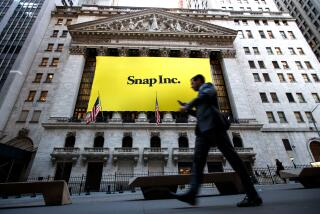Snap.com Mingles Ads in Search Results
- Share via
Internet search engine Snap.com is hoping to expand its sparse audience by making Web surfing more like channel surfing on a TV, but the start-up might attract more attention with another change that further blurs the lines separating ads from listings retrieved by objective formulas.
Under a new format to be unveiled today, Snap will lump search results financed by advertisers in the same column as non-paid Web links that are the most relevant responses to a user’s request.
That combination is a departure from the practices of leading Internet search engines such as Google Inc., Yahoo Inc. and Microsoft Corp.’s MSN, which isolate advertising results in shaded boxes at the top of the page or group them together in a separate stack to the right under the heading “sponsored results.”
The distinctions are meant to comply with Federal Trade Commission guidelines urging that Internet search engines provide “clear and conspicuous” distinctions separating their noncommercial results from ad-driven links.
Pasadena-based Snap, launched in late 2004, is putting a light gray “sponsored result” disclaimer next to the Web addresses of all the ads that crop up.
The label isn’t prominent enough to satisfy Gary Ruskin, executive director of Commercial Alert, a watchdog group behind a 2001 complaint that prompted the FTC to issue its search engine advertising guidelines. Snap’s new system for identifying ads “is neither clear nor conspicuous,” Ruskin said. “It is completely inadequate.”
Snap believes its new approach makes sense because the websites run by advertisers sometimes provide the information or merchandise most likely to satisfy a user’s search request.
“For very commercial searches, you will see all commercial results,” said Tom McGovern, Snap’s chief executive. “We are not trying to mislead anybody.”
By combining commercial and noncommercial results in the same column, Snap cleared enough space on its home page to provide a screen shot of each site that appears in the rankings.
These glimpses change as a user scrolls through the results with a computer’s up-and-down keys.
“It might take a few years for it to catch on, but we think we are establishing a new paradigm for search,” said Snap co-founder Bill Gross, who already has reshaped the industry once.
During the 1990s, Gross invented the first search engine that ranked search results based on how much advertisers were willing to pay for the privilege.
Skeptics initially scoffed at Gross’ idea, but the concept eventually morphed into a successful search engine, Overture, that Yahoo bought in 2003 for $1.8 billion.
Snap, part of Perfect Technologies Inc., hasn’t attracted more than 700,000 unique visitors during any month in the last year, according to research firm Nielsen/NetRatings Inc.






